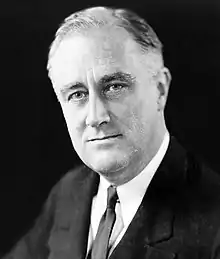Frank Comerford Walker
Frank Comerford Walker (May 30, 1886 – September 13, 1959) was an American lawyer and politician. He served as the United States Postmaster General between 1940 and 1945. He also served as the chairman of the Democratic National Committee from 1943 until 1944.
Frank Walker | |
|---|---|
| Chair of the Democratic National Committee | |
| In office January 18, 1943 – January 23, 1944 | |
| Preceded by | Edward J. Flynn |
| Succeeded by | Robert E. Hannegan |
| 54ᵗʰ United States Postmaster General | |
| In office September 10, 1940 – May 8, 1945 | |
| President | Franklin D. Roosevelt Harry S. Truman |
| Preceded by | James Farley |
| Succeeded by | Robert E. Hannegan |
| Personal details | |
| Born | May 30, 1886 Plymouth, Pennsylvania, U.S. |
| Died | September 13, 1959 (aged 73) New York City, New York, U.S. |
| Political party | Democratic |
| Relatives | Thomas Joseph Walker (brother) |
| Education | Gonzaga University (BA) University of Notre Dame (LLB) |
Biography
He was born in Plymouth, Pennsylvania. He attended Gonzaga University in Spokane, Washington for three years and earned a law degree from Notre Dame in 1909. He then joined his older brother Thomas in a law practice in Butte, Montana. In 1913, he was elected to a term as a Montana state representative.
During World War I, Walker volunteered for the U.S. Army. He became a first lieutenant and saw action on the Western Front. After the war, he returned to his law practice.
In 1925, he moved to New York City, where he became manager and general counsel of Comerford Theatres, a chain of movie theaters owned by his relative Michael Comerford.
In New York, Walker expanded his political activities, and became an early supporter of Franklin D. Roosevelt. In 1931, he co-founded the Roosevelt for President Society. In 1932, he became Treasurer of the Democratic National Committee (DNC). Until Roosevelt's death, Walker was one of his closest advisers.
When Roosevelt became President in 1933, he appointed Walker executive secretary of the National Emergency Council, a New Deal agency related to the NRA.
In 1940, Walker became Postmaster General (succeeding James Farley, who had also been DNC Chairman and Roosevelt's campaign manager). As Postmaster General, Walker continued his role as political adviser, often taking part in matters far removed from the Post Office. For instance, during the negotiations which preceded the December 1941 attack on Pearl Harbor, he was in regular contact with Japanese Ambassador Nomura.[1]
In 1943, Walker also became Chairman of the DNC, serving until 1944. In 1944, he stepped down from the DNC, and was succeeded by Robert Hannegan.
In May 1945, Walker announced his retirement as Postmaster General, to allow President Harry Truman to appoint his own candidate to the office. Truman selected Hannegan to succeed Walker in this office too, effective July 1.
Later in 1945, Truman appointed Walker as a member of the first U.S. delegation to the United Nations.
He died in New York City, New York on September 13, 1959, at the age of 73.
References
- Feis, Herbert (1962) [1050]. The Road to Pearl Harbor (2nd ed.). New York: Atheneum. pp. 176n, 304, 307n.
Further reading
Walker, Frank Comerford (1997). Ferrell, Robert H. (ed.). FDR's Quiet Confidant: The Autobiography of Frank C. Walker. University Press of Colorado. ISBN 0870813978. LCCN 96054006.
External links
| Political offices | ||
|---|---|---|
| Preceded by James Farley |
United States Postmaster General 1940–1945 |
Succeeded by Robert E. Hannegan |
| Party political offices | ||
| Preceded by Edward J. Flynn |
Chair of the Democratic National Committee 1943–1944 |
Succeeded by Robert E. Hannegan |


